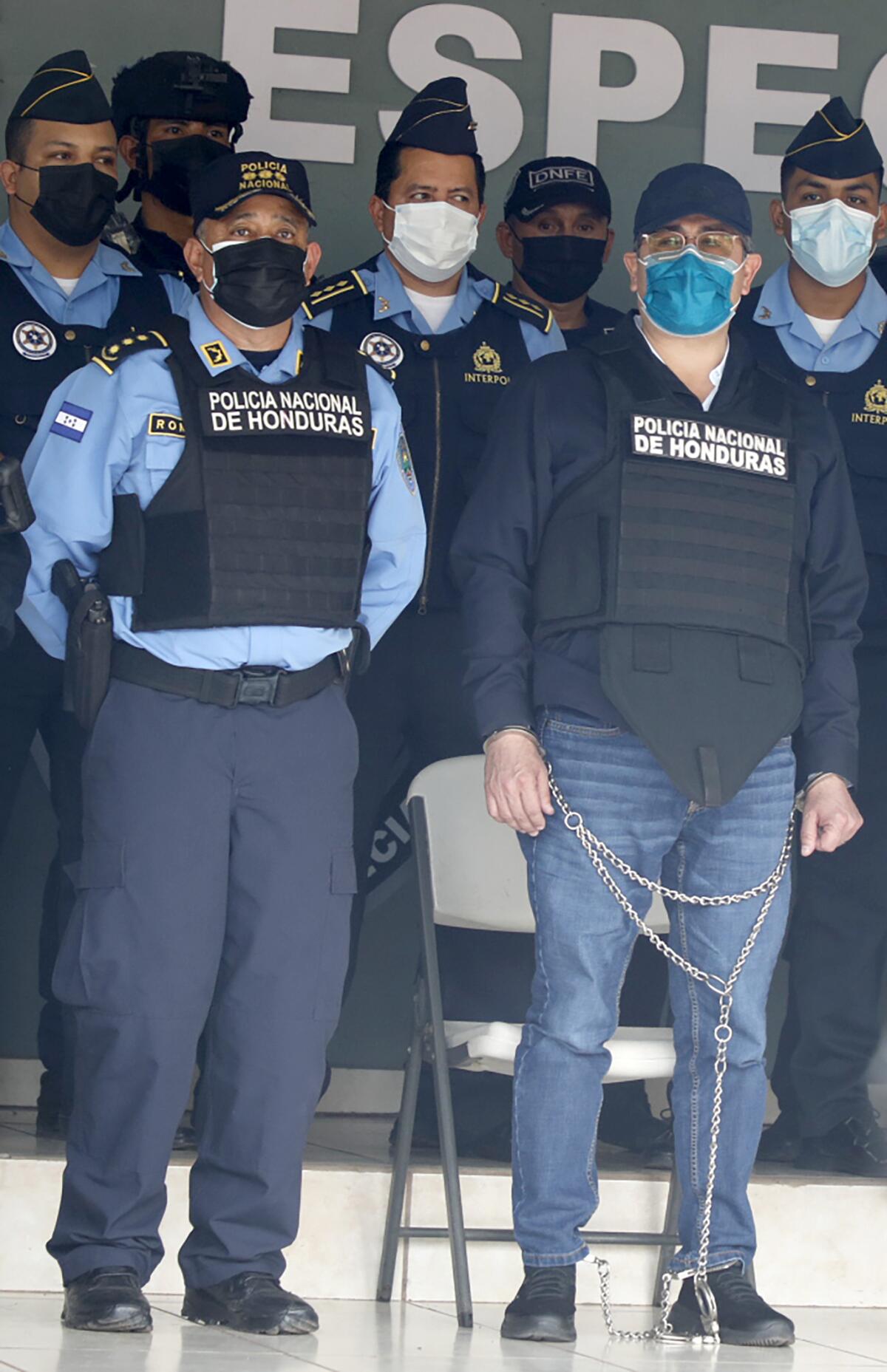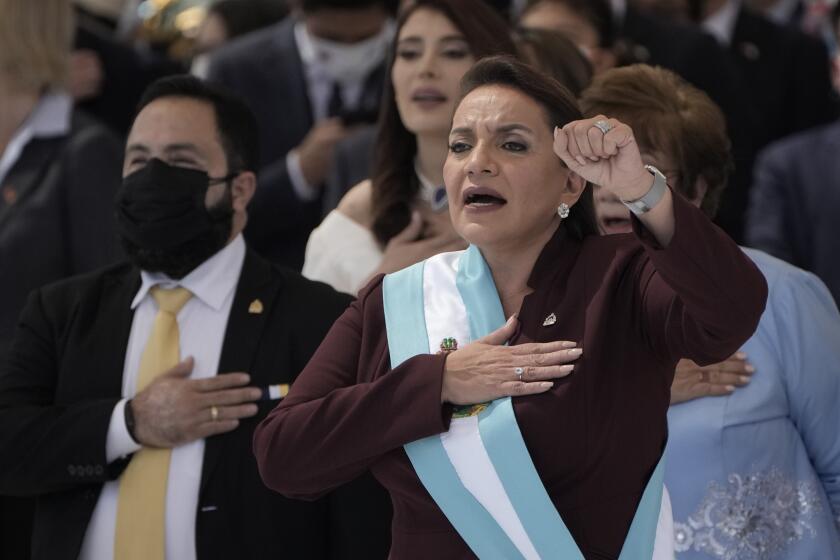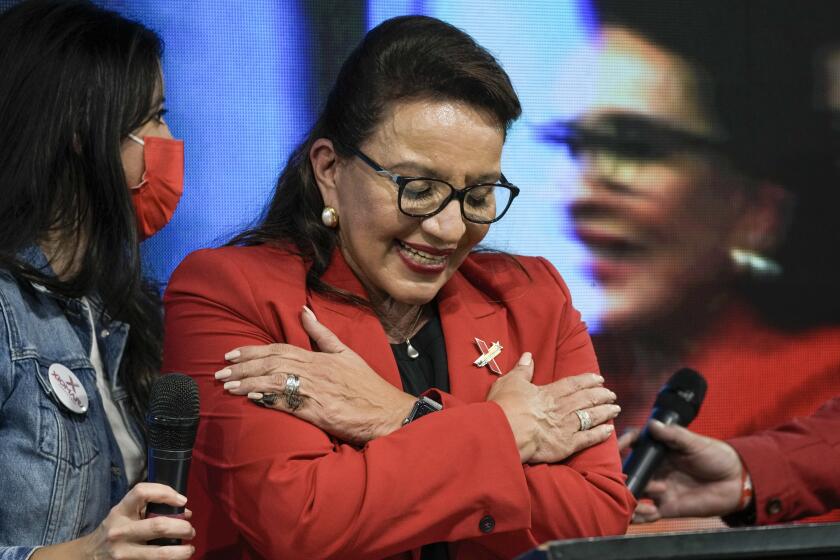Honduran ex-President Hernández arrested at U.S. request

- Share via
TEGUCIGALPA, Honduras — Police arrested former Honduran President Juan Orlando Hernández at his home on Tuesday, following a request by the United States government for his extradition on drug trafficking and weapons charges.
The arrest came less than three weeks after Hernández left office and followed years of allegations by U.S. prosecutors of his alleged links to drug traffickers.
Hernández exited his home flanked by police, shackled at the wrists and ankles, and wearing a bulletproof jacket. He got into a police vehicle and was driven away. A police helicopter waiting nearby took flight and appeared to be escorting the caravan.
The Supreme Court of Justice had designated a judge Tuesday morning to handle the case and hours later the judge signed an order for Hernández’s arrest, said court spokesman Melvin Duarte. The security ministry, which had Hernández’s home surrounded since Monday evening, moved quickly to take him into custody.
It was a long-awaited fall for a leader reviled in his home country, who enjoyed support from the Trump administration but had been kept at arm’s length by a Biden White House targeting Central America’s endemic corruption as a root cause of migration.
Honduran Security Minister Ramón Sabillón, who was fired by Hernández as head of the national police in 2014, said Hernández had conspired “with cartels to traffic [drugs] and corrupt many public institutions, which led to social deterioration and undermined the application of justice in Honduras.”
He said the main charges Hernández faces in the U.S. are drug trafficking, using weapons for drug trafficking and conspiracy to use weapons in drug trafficking.
Nicole Navas, a spokeswoman for the U.S. Department of Justice, declined to comment.
Xiomara Castro, Honduras’ new leader, faces high expectations to turn around her deeply troubled country despite a new legislative crisis.
Hernández left office Jan. 27 with the swearing-in of President Xiomara Castro. The same day, he was sworn in as Honduras’ representative to the Central American Parliament.
His lawyer, Hermes Ramírez, told local media his client had immunity as a member of the regional parliament and said government forces were not following proper procedures.
Various contingents of the national police, including special forces, as well as military police were present around Hernández’s neighborhood Monday night. Barriers at all of the entrances kept out media and even residents.
Members of the security forces entered the area with weapons, wearing balaclavas and with handcuffs dangling from their ballistic vests. Some neighbors said the house had been dark and they believe unoccupied.
As part of his defense, Hernández often pointed to the fact that Honduras began allowing the extradition of Hondurans on drug trafficking charges while he was president of the congress.
But U.S. prosecutors have alleged that he was taking bribes from drug traffickers on the promise of protecting them once he was Honduras’ president.
On the eve of a presidential inauguration, Honduras faces a new political crisis.
U.S. prosecutors in New York repeatedly implicated him in his brother’s 2019 drug trafficking trial, alleging that his political rise was fueled by drug profits.
That brother, Juan Antonio “Tony” Hernández, a former Honduran congressman, was sentenced to life in prison on drug and weapons charges in March 2021. At his sentencing, Assistant U.S. Atty. Matthew Laroche characterized the crimes as “state-sponsored drug trafficking.”
Juan Orlando Hernández took office Jan. 27, 2014. Hernández used a friendly Supreme Court to overcome Honduras’ constitutional ban on reelection and won a second term in 2017 in elections marred by irregularities.
Around midnight Monday, 56-year-old Jorge Arturo Vega, a supporter of Castro’s Liberty and Refoundation party, stood outside a police barricade in Hernández’s neighborhood celebrating.
“This is a party we’ve been waiting a long time for,” Vega said, thinking back over the dozen years since Hernández came up in the congress. “We couldn’t stand this drug trafficker, criminal, killer in the presidential house any longer.”
Associated Press writer Marlon González reported from Tegucigalpa and AP writer Christopher Sherman from Mexico City. AP videojournalist Elmer Martínez in Tegucigalpa and AP writer Claudia Torrens in New York contributed to this report.
More to Read
Sign up for Essential California
The most important California stories and recommendations in your inbox every morning.
You may occasionally receive promotional content from the Los Angeles Times.












